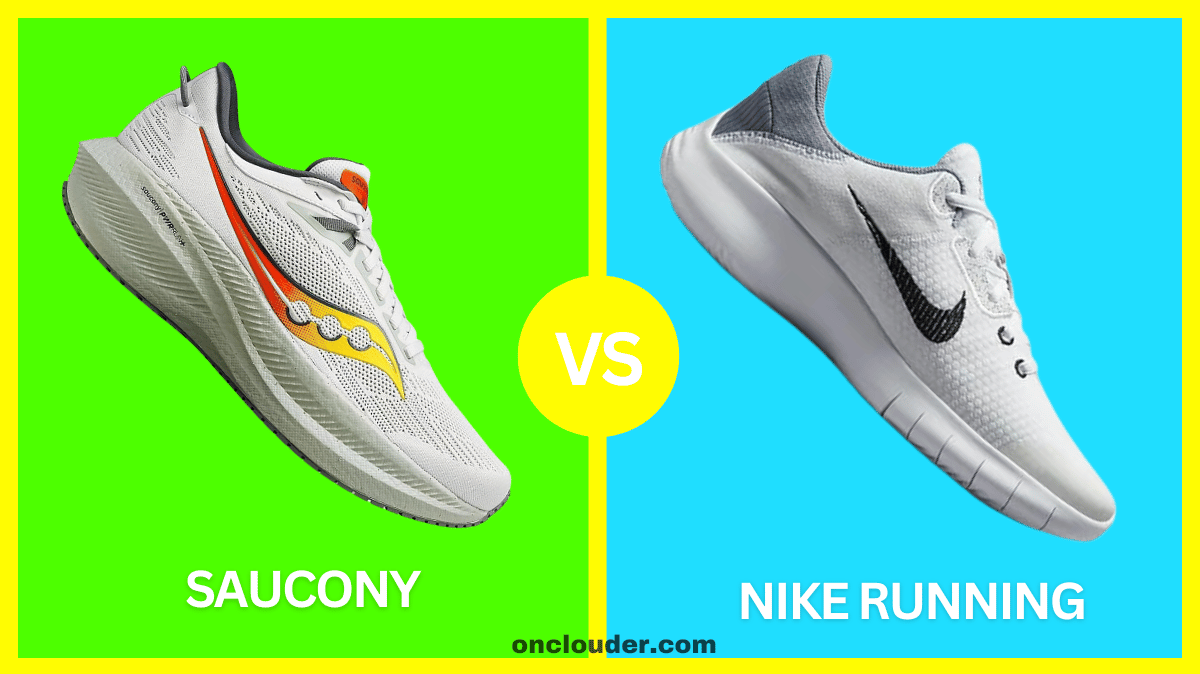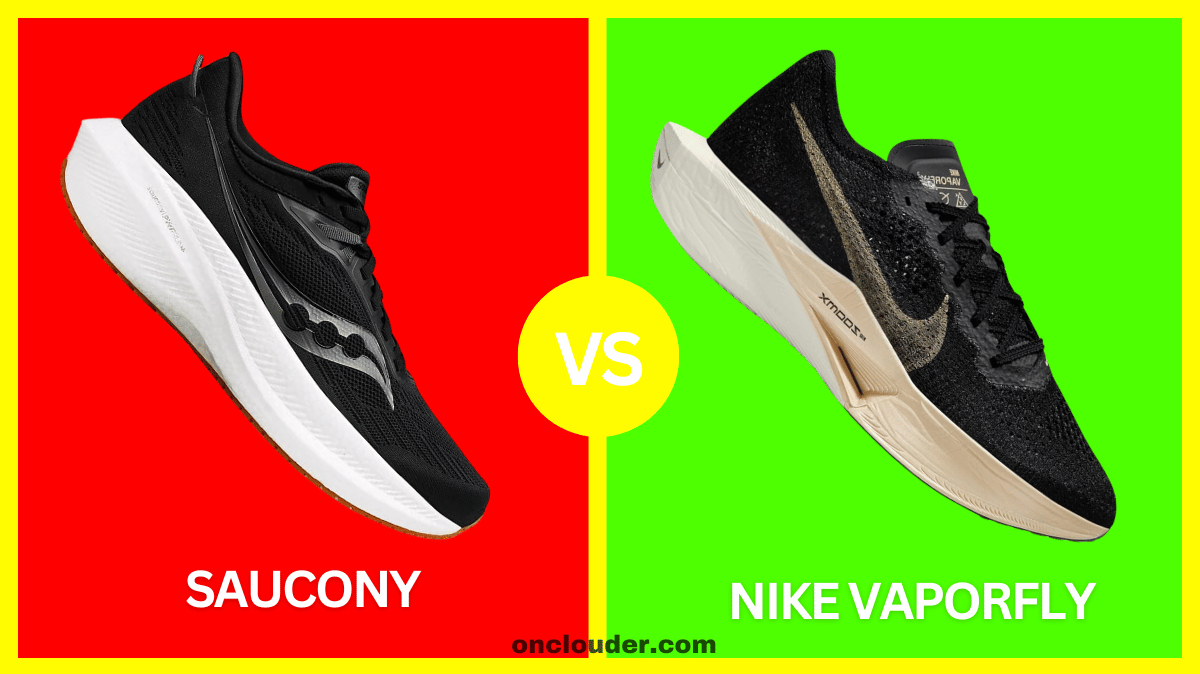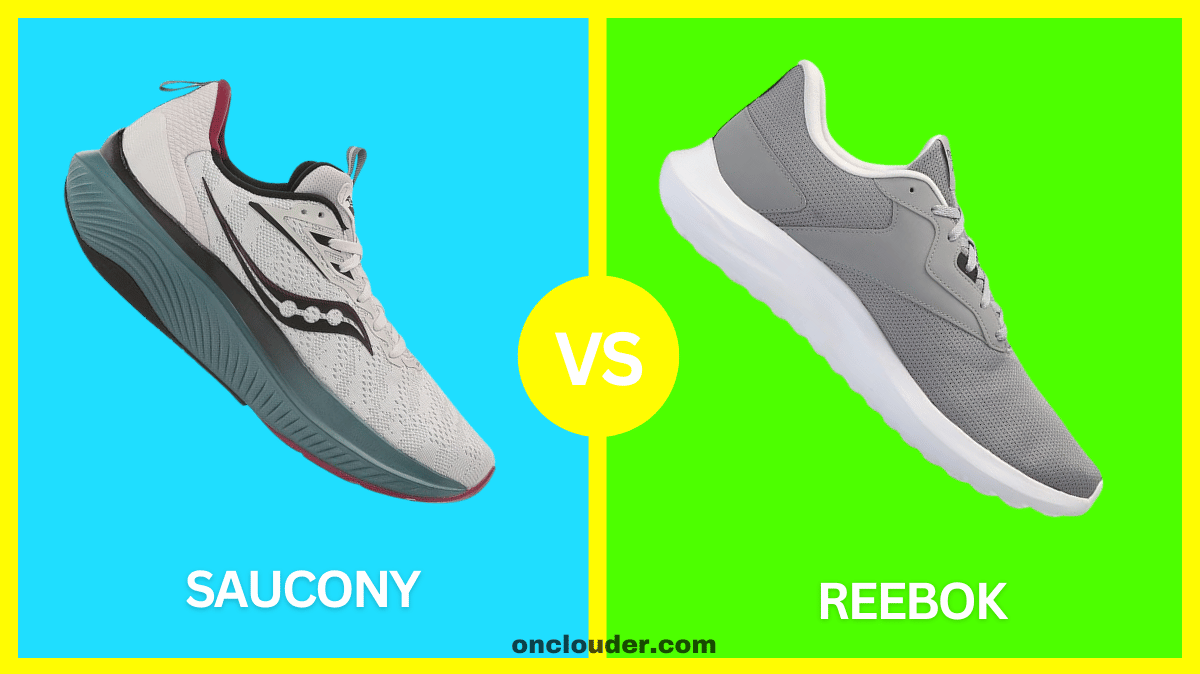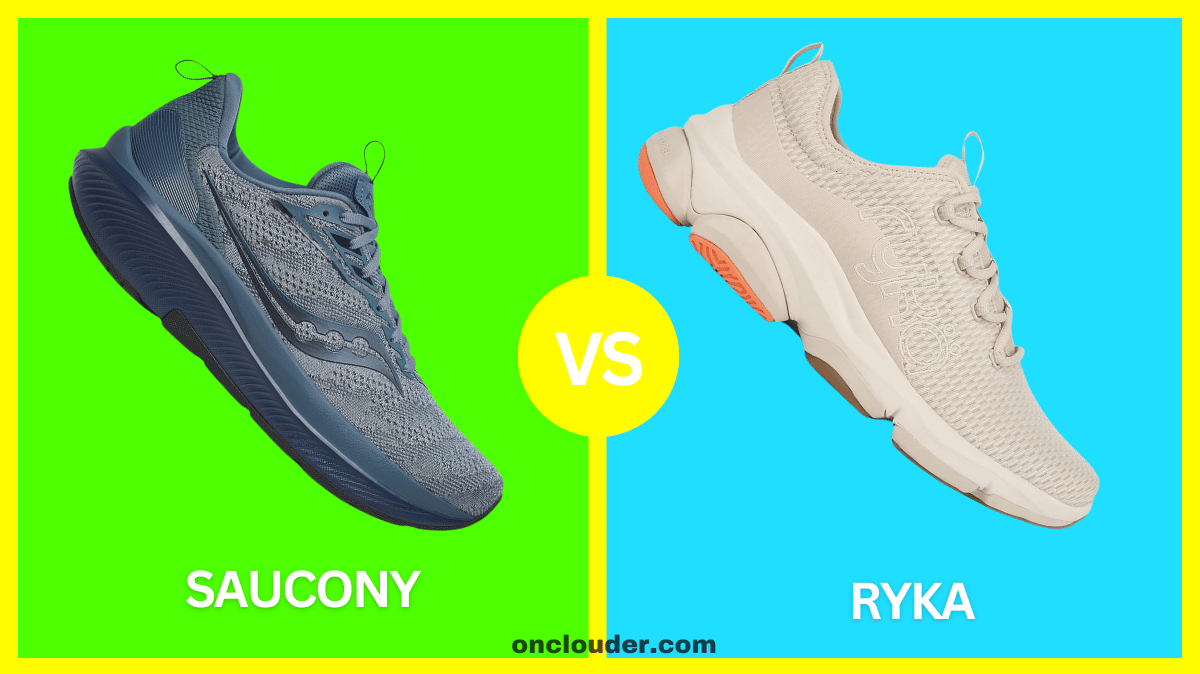Are you looking for new running shoes? It can be hard to choose between all the different brands out there. Two popular choices are Saucony and Nike.
We’ll compare these two brands to help you decide which might be better for you.

Contents
- 1 Quick Comparison: Saucony vs Nike Running Shoes
- 2 What Makes a Good Running Shoe?
- 3 Comfort: Which Feels Better on Your Feet?
- 4 Support: Which Keeps Your Feet in Place?
- 5 Durability: Which Lasts Longer?
- 6 Breathability: Which Keeps Your Feet Cool?
- 7 Weight: Which is Lighter on Your Feet?
- 8 Cushioning: Which Gives a Softer Ride?
- 9 Shoe Fit: Which Matches Your Foot Shape?
- 10 Stability: Which Helps Prevent Overpronation?
- 11 Quality: Which is Better Made?
- 12 Style: Which Looks Cooler?
- 13 Size Options: Which Has More Choices?
- 14 Materials: What Are They Made Of?
- 15 Flexibility: Which Bends More Easily?
- 16 Water Resistance: Which Keeps Your Feet Drier?
- 17 Sole Design: Which Grips Better?
- 18 User Reviews and Pricing
- 19 Pros and Cons
- 20 Conclusion
- 21 Frequently Asked Questions
Quick Comparison: Saucony vs Nike Running Shoes
The main difference between Saucony and Nike running shoes is their fit and design philosophy. Saucony focuses on stability and support, often preferred by runners with wider feet. Nike emphasizes innovation and style, typically suiting narrower feet.
Both offer quality shoes, but Saucony tends to be more durable while Nike provides more trendy designs.
Now, here’s a detailed comparison table for “Saucony vs Nike Running Shoes“:
| Feature | Saucony | Nike |
| Fit | Wider toe box, snug heel | Narrower overall, especially midfoot |
| Cushioning | PWRRUN and PWRRUN+ foams | React and ZoomX foams |
| Stability | More stability models | Fewer stability options |
| Durability | Generally more durable | Varies by model |
| Style | Classic, understated designs | Bold, trendy designs |
| Price Range | $100-$180 | $90-$250 |
| Weight | 7-10 oz (varies by model) | 6-11 oz (varies by model) |
| Breathability | Good mesh uppers | Excellent (especially with Flyknit) |
| Size Options | Regular and wide | Narrow, regular, and wide |
| Best For | Stability, wider feet, long-distance | Speed, narrow feet, style-conscious runners |
In summary: Saucony and Nike both make great running shoes, but they have different strengths. Saucony is known for comfort, support, and durability, making them great for long runs and wider feet.
Nike shines with stylish designs, lightweight shoes, and innovative materials like Flyknit, appealing to fashion-conscious runners and those with narrower feet. The best choice depends on your foot shape, running style, and personal preferences. Try on shoes from both brands to see which feels better for you.
What Makes a Good Running Shoe?
Before we dive into comparing Saucony and Nike, let’s talk about what makes a good running shoe:
- Comfort: Your feet should feel good when you run
- Support: The shoe should help your feet and legs stay in the right position
- Durability: It should last a long time without wearing out
- Breathability: Your feet should stay cool and dry
- Weight: Lighter shoes can help you run faster and longer
Now let’s see how Saucony and Nike compare in these areas and more!
Comfort: Which Feels Better on Your Feet?
Saucony Shoes
Saucony shoes are known for being very comfortable. They use special foam in their soles that feels soft and bouncy. Many runners say Saucony shoes feel great right out of the box, without needing to break them in.
Nike Shoes
Nike also makes comfortable shoes. They use different types of foam in their soles, like React and ZoomX, which give a soft, springy feel. Some runners find Nike shoes take a little longer to break in, but then feel very comfortable.
Winner: Tie Both brands make very comfortable shoes. It really comes down to what feels best on your own feet.
Support: Which Keeps Your Feet in Place?
Saucony Shoes
Saucony designs their shoes to keep your foot stable. They have special features like a snug heel cup and a sturdy midfoot to prevent your foot from moving around too much.
Nike Shoes
Nike shoes also offer good support, especially in their stability models. They use technologies like Flywire cables to wrap around your foot and keep it in place.
Winner: Saucony (by a small margin) While both brands offer good support, Saucony’s designs tend to focus more on stability for all types of runners.
Durability: Which Lasts Longer?
Saucony Shoes
Saucony shoes are known for being tough and long-lasting. They use strong materials and reinforced areas in high-wear spots.
Nike Shoes
Nike shoes can be durable, but some models wear out faster than others. Their lightweight racing shoes tend to wear out quicker than their everyday training shoes.
Winner: Saucony On average, Saucony shoes tend to last longer before needing to be replaced.
Breathability: Which Keeps Your Feet Cool?
Saucony Shoes
Saucony uses breathable mesh in many of their shoes. This helps air flow in and out, keeping your feet cool and dry.
Nike Shoes
Nike is known for their Flyknit technology, which creates a very breathable upper part of the shoe. Many of their models have excellent airflow.
Winner: Nike While both brands make breathable shoes, Nike’s Flyknit technology gives them a slight edge in this category.
Weight: Which is Lighter on Your Feet?
Saucony Shoes
Saucony makes both lightweight and standard weight shoes. Their racing shoes are especially light.
Nike Shoes
Nike offers a wide range of weights, from ultra-light racing shoes to more substantial training shoes.
Winner: Tie Both brands offer very lightweight options as well as standard weight shoes. It depends on the specific model you choose.
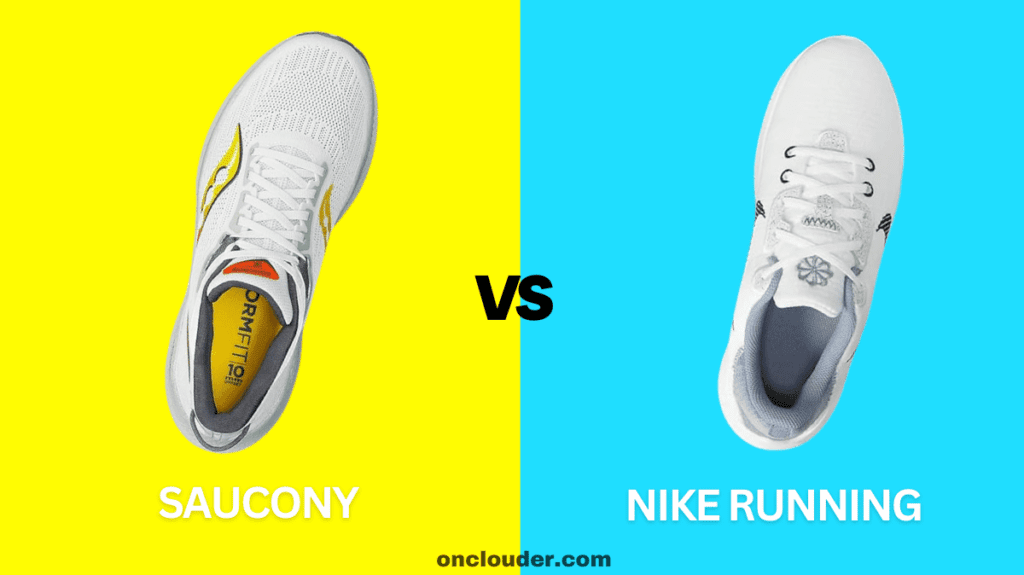
Cushioning: Which Gives a Softer Ride?
Saucony Shoes
Saucony uses their PWRRUN and PWRRUN+ foams to provide soft, bouncy cushioning. Many runners find these very comfortable for long runs.
Nike Shoes
Nike’s React and ZoomX foams are known for being very soft and responsive. Their shoes often have a plush, cushioned feel.
Winner: Nike (by a small margin) While both brands offer great cushioning, Nike’s latest foam technologies are slightly ahead in terms of softness and bounce.
Shoe Fit: Which Matches Your Foot Shape?
Saucony Shoes
Saucony shoes often have a wider toe box, which can be good for runners with wider feet. They also tend to have a snug midfoot and heel.
Nike Shoes
Nike shoes usually have a narrower fit, especially in the midfoot. This can be great for runners with narrow feet, but might feel tight on wider feet.
Winner: Depends on your foot shape If you have wider feet, Saucony might be better. For narrow feet, Nike could be a better choice.
Stability: Which Helps Prevent Overpronation?
Saucony Shoes
Saucony offers several stability models designed to prevent overpronation (when your foot rolls inward too much). These shoes have firmer foam on the inner side of the sole.
Nike Shoes
Nike also makes stability shoes, but they have fewer options than Saucony. Their stability features are often more subtle.
Winner: Saucony For runners who need extra stability, Saucony offers more options and more pronounced stability features.
Quality: Which is Better Made?
Saucony Shoes
Saucony has a reputation for making high-quality, well-constructed shoes. They pay attention to details like stitching and glue bonds.
Nike Shoes
Nike also makes quality shoes, but some runners feel their quality can be inconsistent across different models.
Winner: Saucony (by a small margin) While both brands make good quality shoes, Saucony edges out Nike for overall consistency in construction quality.
Style: Which Looks Cooler?
Saucony Shoes
Saucony shoes have a classic running shoe look. They offer a range of colors, but tend to be more understated in their designs.
Nike Shoes
Nike is known for bold, trendy designs. They often use bright colors and unique patterns in their shoes.
Winner: Nike If you’re looking for shoes that stand out and look cool, Nike offers more eye-catching designs.

Size Options: Which Has More Choices?
Saucony Shoes
Saucony offers a good range of sizes, including wide options for many models.
Nike Shoes
Nike has a very wide range of sizes, including narrow, regular, and wide options for many shoes.
Winner: Nike Nike offers slightly more size options, especially when it comes to narrow sizes.
Materials: What Are They Made Of?
Saucony Shoes
Saucony uses a mix of synthetic materials and mesh in their uppers. Their soles are usually made of rubber and foam.
Nike Shoes
Nike uses similar materials, but also incorporates their Flyknit technology in many shoes. This is a special woven fabric that’s light and breathable.
Winner: Tie Both brands use high-quality materials in their shoes. The best choice depends on what feels good to you.
Flexibility: Which Bends More Easily?
Saucony Shoes
Saucony shoes often have a good balance of flexibility and support. They allow your foot to move naturally while still providing structure.
Nike Shoes
Nike’s flexibility varies by model. Some of their shoes are very flexible, while others are more rigid for support.
Winner: Depends on the model Both brands offer flexible and less flexible options. You’ll need to try specific shoes to see which feels best.
Water Resistance: Which Keeps Your Feet Drier?
Saucony Shoes
Some Saucony models have water-resistant uppers, which can help keep your feet dry in light rain or wet grass.
Nike Shoes
Nike also offers some water-resistant models, particularly in their trail running shoes.
Winner: Tie Both brands offer some water-resistant options, but neither specializes in this feature for their road running shoes.
Sole Design: Which Grips Better?
Saucony Shoes
Saucony uses different tread patterns depending on the shoe’s purpose. Their trail shoes have deeper lugs for better grip on rough terrain.
Nike Shoes
Nike also varies their sole designs. They use their own rubber compounds to provide good traction on different surfaces.
Winner: Tie Both brands offer good traction, with specific designs for road and trail running.
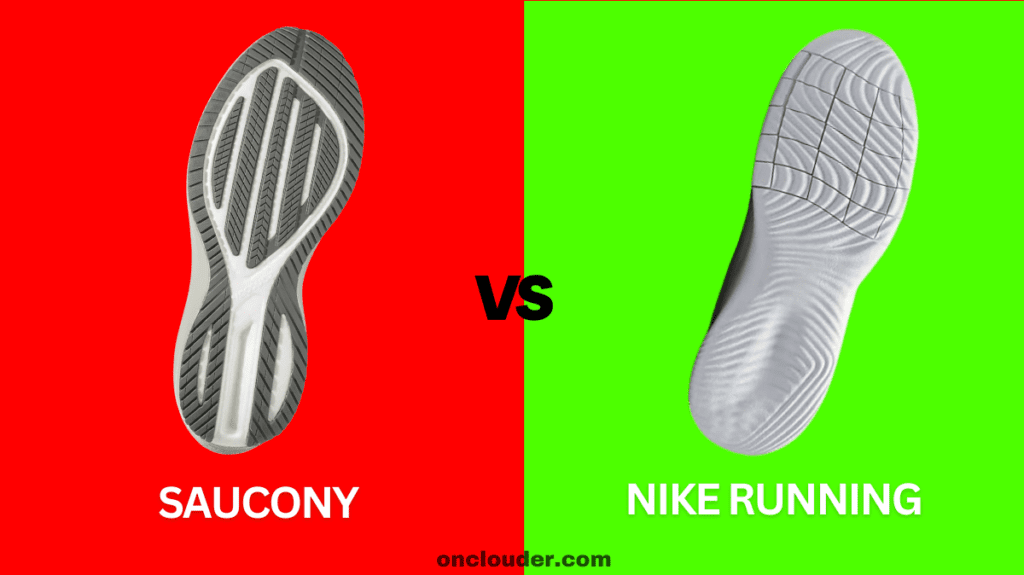
User Reviews and Pricing
Here’s a summary of user reviews for popular models from each brand:
| Brand | Model | User Rating | Price Range |
|---|---|---|---|
| Saucony | Ride 15 | ⭐⭐⭐⭐⭐ (4.5/5) | $130-$150 |
| Saucony | Triumph 20 | ⭐⭐⭐⭐⭐ (4.8/5) | $160-$180 |
| Nike | Air Zoom Pegasus 39 | ⭐⭐⭐⭐⭐ (4.3/5) | $120-$140 |
| Nike | React Infinity Run 3 | ⭐⭐⭐⭐⭐ (4.2/5) | $160-$180 |
Remember, prices can change and may be different depending on where you shop.
Pros and Cons
| Brand | Pros ✅ | Pros ⚠️ |
|---|---|---|
| Saucony | Comfy right away | Not as many cool designs |
| Last a long time | Might feel too wide for some feet | |
| Good for wide feet | Not as light as some Nike shoes | |
| Lots of support | Fewer choices for narrow feet | |
| Great for long runs | Not as popular for everyday wear | |
| Nike | Lots of cool designs | Might need time to feel comfy |
| Very light shoes | Some models wear out faster | |
| Great for narrow feet | Can be more expensive | |
| Bouncy foam feels fun | Fewer choices for very wide feet | |
| Popular for everyday wear | Not as much support in some models |
Conclusion
Both Saucony and Nike make great running shoes, but they have some differences:
Saucony might be better if you want:
- More stability and support
- Longer-lasting shoes
- A wider toe box
Nike might be better if you want:
- More stylish designs
- Very lightweight options
- A narrower fit
In the end, the best shoe for you is the one that feels most comfortable on your feet. If possible, try on shoes from both brands to see which you like better.
Frequently Asked Questions
Are Saucony or Nike shoes better for beginners?
Both brands offer good options for beginners. Look for shoes with good cushioning and support.
Which brand is better for long-distance running?
Both have great options. Saucony’s Triumph and Nike’s React Infinity are popular for long runs.
Are Nike or Saucony shoes better for wide feet?
Saucony tends to offer more options for wide feet, but Nike does have some wide sizes available.
Which brand is more affordable?
Prices are similar for both brands. You can find budget-friendly and high-end options from each.
Can I use Saucony or Nike running shoes for other sports?
While designed for running, many people use these shoes for other activities. However, sport-specific shoes might be better for other activities.

